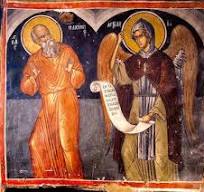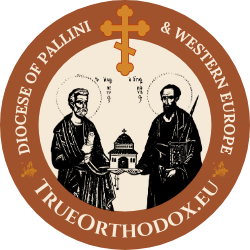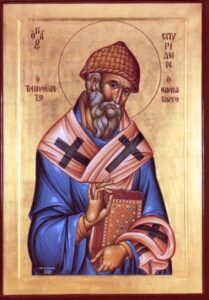St. Pachomius (May 15): The Father of Communal Monasticism –

Early Life and Conversion
St. Pachomius was born in 292 AD in Thebes, Egypt, to pagan parents. His early years were marked by a typical upbringing in the Egyptian countryside, but everything changed when he was conscripted into the Roman army. It was during this period that Pachomius encountered Christianity for the first time. Impressed by the charity and kindness of local Christians who ministered to soldiers, he vowed to explore this faith further if he ever gained his freedom.
Upon his release from military service, Pachomius was baptized and began his spiritual journey. His initial steps in the Christian life led him to live as a hermit under the guidance of an elder monk named Palamon. However, Pachomius soon felt a call to something more communal—a life where monks could live together in brotherly love and mutual support.

Founding of the Cenobitic Life
Around 320 AD, Pachomius established his first monastic community at Tabennisi in Upper Egypt. This new form of monastic life, known as cenobitic (from the Greek “koinos bios,” meaning “common life”), contrasted sharply with the solitary hermit lifestyle that had predominated. Pachomius envisioned a structured community where monks could live, pray, and work together under a common rule.
A significant moment in the life of St. Pachomius was his vision of an angel who showed him the habit that his monks were to wear. This vision confirmed the heavenly approval of his communal monastic endeavor and provided a distinctive identity for his followers. The habit symbolized their commitment to the monastic life and their unity under Pachomius’ rule.
Pachomius’ Rule, which would later influence the monastic rules of St. Basil the Great and St. Benedict, laid out a detailed framework for communal living. It emphasized poverty, chastity, obedience, and manual labor, with a rigorous schedule of prayer, meals, and work. This disciplined yet communal approach allowed monks to support each other spiritually and materially, fostering a deeper sense of fellowship and shared purpose.
The Growth of Pachomian Monasticism
The model established by St. Pachomius proved incredibly fruitful. By the time of his death in 348 AD, he had founded nine monasteries for men and two for women, with thousands of monks and nuns following his rule. These monastic communities became centers of Christian life, radiating spiritual and practical wisdom to the broader church and society.
The Pachomian monasteries were notable not only for their spiritual rigor but also for their social and economic contributions. They were largely self-sufficient, with monks engaging in agriculture, weaving, and other trades to support their communities and aid the poor. This integration of work and prayer exemplified the holistic Christian life that St. Pachomius sought to cultivate.
Spiritual Legacy
St. Pachomius’ contributions to Christian monasticism cannot be overstated. His cenobitic model provided a sustainable and communal approach to monastic life that balanced solitude with fellowship, contemplation with action. This balance is a cornerstone of Orthodox monasticism today, guiding countless monks and nuns in their spiritual journeys.
Moreover, St. Pachomius’ life serves as a powerful testament to the transformative power of faith. His journey from paganism to sainthood underscores the profound impact that Christian community and charity can have on individuals. His legacy invites us to consider how we might live out our faith in community, supporting one another in our spiritual and daily lives.
Conclusion
As we reflect on the life of St. Pachomius, we are reminded of the enduring importance of community, discipline, and faith. His vision for a communal monastic life, affirmed by his divine vision of the monastic habit, continues to inspire Orthodox Christians to seek a deeper connection with God and each other. May we, like St. Pachomius, strive to build communities that reflect the love, discipline, and unity of the early Christian church, drawing ever closer to Christ through our shared journey.
Through the prayers of St. Pachomius, may we be strengthened in our own spiritual endeavors, finding in his example a guide to living a life of faith and fellowship.
Glory to God for all things!








